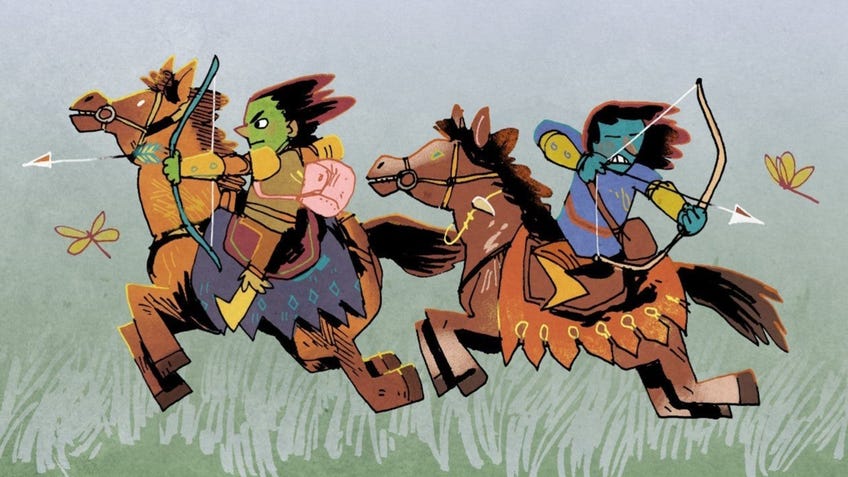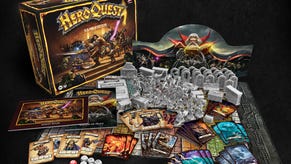Oath could finally deliver on the exciting lost potential of legacy board games
All of the memories with none of the sacrifice.
Silence fell for the first card death of Risk Legacy. In a moment, what had been a hubbub of excitement and backstabbing cut out, and everyone stared at the ill-fated card in my hands. Despite the board game’s own insistence, tearing it into pieces felt wrong - like willingly joining in an act of vandalism.
"I can't believe you're going to do this," someone said.
I did it. It felt like liberation. While I never sleeved cards, it was still a release from all the years I'd spent taking care of board game boxes and auditing their contents. The act of destruction was, in fact, one of creation: in that instant, I'd made the game ours. The first step in our game of Risk Legacy becoming unlike any other copy.

A dozen plays later and Risk Legacy sits proudly among my favourite board games. That's in part because it is such a massive improvement over the much-maligned original. Matches play out in under two hours - often well under. The central gameplay is an exhilarating mix of diplomacy, dice and devising of plans. But it's the legacy elements that elevate it into something special. Board game narratives are too often railroads, but in Risk Legacy the way things unfold is dynamic, and there are no take-backs.
For every legacy game that worked, there was one which had that engaging narrative hook but poor gameplay, and one with outstanding gameplay mechanics but legacy aspects that felt like an afterthought.
In the rush to follow Risk Legacy’s success, designers missed these lessons. For every legacy game like Pandemic Legacy that worked, there was one, like SeaFall, which had that engaging narrative hook but poor gameplay, and one, like Gloomhaven, with outstanding gameplay mechanics but legacy aspects that felt like an afterthought. People even sold removable sticker sheets so you could mark exploration on your map while keeping your copy pristine.
This isn’t just down to a fear of irreversible ‘damage’ but also to a fear of closure. For those who dislike the legacy concept, a key charge is that legacy board games "end" when they run out of new elements to add. This seems odd when you can continue to play your now-unique copy, with every session adding its narrative to the ongoing drama - but it's what people wanted, and so designers set off on a quest to get the best of both worlds.

The result is a genre of "resettable" board games that are legacy in all but name. Recent release Aftermath is a prime example. A storybook-based board game where you found and manage a colony of anthropomorphic critters, it comes with a slew of tuckboxes that you can use to sort and store the cards, decks and upgrades that change depending on how your story pans out. At the end of the campaign, if you want to play again, you can sort them back into their original decks and away you go.
By increasing replay value in place of evolution, the experience becomes generic instead of personal.
It's fun enough, but these games are missing something: that act of creative destruction. By removing what makes each copy of the game unique, you are removing what makes it uniquely yours. By increasing replay value in place of evolution, the experience becomes generic instead of personal. Japanese art has the concept of mono no aware: the ‘pathos of things’ that makes transience an essential part of their joy. Like a pinned butterfly, trying to preserve a vivacious, spirited thing loses much of what made it special in the first place.
If that's what people really want from a game, that's their choice. But it seemed that we were in danger of losing what made us excited for legacy board games in the first place. Narratives were back on a safe railroad instead of Risk Legacy's card-tearing, continent-altering conflicts that, like the real thing, changed its world forever. The legacy concept had been decommissioned and re-absorbed into the comfort of the mainstream board gaming hobby.
Until Oath.
Oath: Chronicles of Empire & Exile is a legacy game that promises to deliver the best of both worlds. Nothing gets destroyed or changed when you play. Instead, the legacy element is that the results of each playthrough determine the starting setup of the next one. At first, it feels like nothing at all. But thanks to some breathtaking design from creator Cole Wehrle, each session of Oath will eventually accumulate and reflect dozens of previous plays. The kingdoms that bicker and fight on the tabletop will be yours and yours alone, shaped by the history of disputes and decisions that went before.
While we wait to see if Oath’s release next year truly represents the next chapter of legacy games, it's worth reflecting that any board game can get its own mono no aware if you let it. Before Risk Legacy I had a copy of ordinary Risk that I'd played dozens of times with the same friends. As a mass-market board game, we took no care: it got played indoors and outdoors, at parties and on lazy Sundays. Over time the board and cards wore and tore, got stained and burned. Now, I look at that set and every mark is a memorial to joy, a recollection of time well spent. You don't need the permission of the rules to sign a board, or do whatever to make a game and story uniquely yours.



